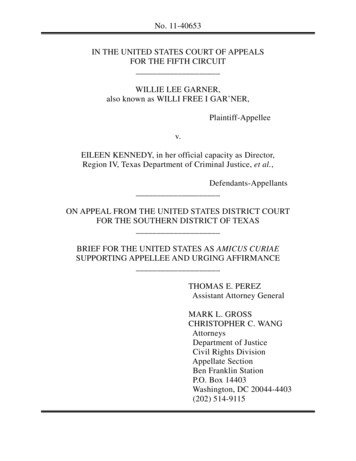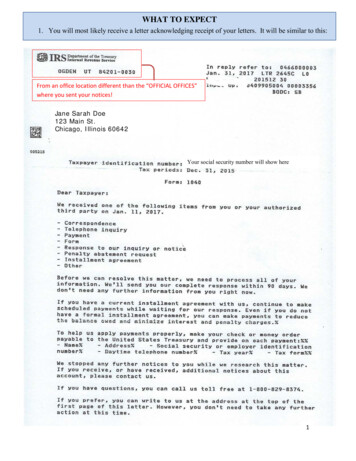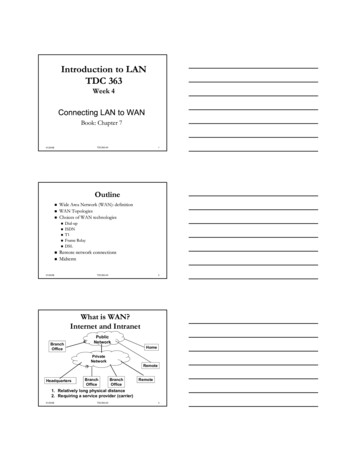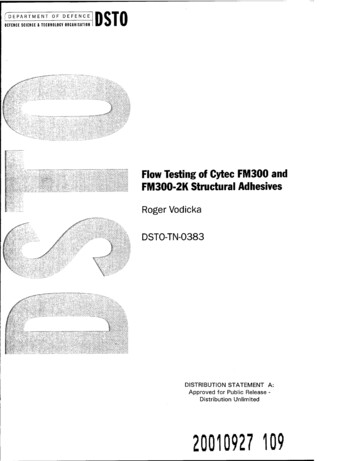
Transcription
No. 11-40653IN THE UNITED STATES COURT OF APPEALSFOR THE FIFTH CIRCUITWILLIE LEE GARNER,also known as WILLI FREE I GAR’NER,Plaintiff-Appelleev.EILEEN KENNEDY, in her official capacity as Director,Region IV, Texas Department of Criminal Justice, et al.,Defendants-AppellantsON APPEAL FROM THE UNITED STATES DISTRICT COURTFOR THE SOUTHERN DISTRICT OF TEXASBRIEF FOR THE UNITED STATES AS AMICUS CURIAESUPPORTING APPELLEE AND URGING AFFIRMANCETHOMAS E. PEREZAssistant Attorney GeneralMARK L. GROSSCHRISTOPHER C. WANGAttorneysDepartment of JusticeCivil Rights DivisionAppellate SectionBen Franklin StationP.O. Box 14403Washington, DC 20044-4403(202) 514-9115
TABLE OF CONTENTSPAGESTATEMENT OF THE ISSUE.1INTEREST OF THE UNITED STATES .2STATEMENT OF THE CASE.31.Factual Background .32.Proceedings Below .4SUMMARY OF ARGUMENT .6ARGUMENTTHE TDCJ’S BAN ON BEARDS VIOLATES RLUIPABECAUSE IT IS NOT THE LEAST RESTRICTIVE MEANS OFADVANCING COMPELLING GOVERNMENTAL INTERESTS .9CONCLUSION.31CERTIFICATE OF SERVICECERTIFICATE REGARDING PRIVACY REDACTIONSAND VIRUS SCANNINGCERTIFICATE OF COMPLIANCEADDENDUM
TABLE OF AUTHORITIESCASES:PAGEAli v. Quarterman, 434 F. App’x 322 (5th Cir. 2011)(per curiam) (unpublished) .17Ashcroft v. American Civil Liberties Union, 542 U.S. 656 (2004) .10, 12Baranowski v. Hart, 486 F.3d 112 (5th Cir.),cert. denied, 552 U.S. 1062 (2007).26Church of the Lukumi Babalu Aye, Inc. v. City of Hialeah,508 U.S. 520 (1993).15Cinel v. Connick, 15 F.3d 1338 (5th Cir.),cert. denied, 513 U.S. 868 (1994).22Cutter v. Wilkinson, 544 U.S. 709 (2005) .passimDeMoss v. Crain, 636 F.3d 145 (5th Cir. 2011). 16-17Diaz v. Collins, 114 F.3d 69 (5th Cir. 1997) .16Employment Div. v. Smith, 494 U.S. 872 (1990).10Fegans v. Norris, 537 F.3d 897 (8th Cir. 2008) .24Fowler v. Crawford, 534 F.3d 931 (8th Cir. 2008),cert. denied, 129 S. Ct. 1585 (2009).24Fraternal Order of Police v. City of Newark, 170 F.3d 359 (3d Cir.),cert. denied, 528 U.S. 817 (1999). 22-23Freeman v. Texas Dep’t of Criminal Justice,369 F.3d 854 (5th Cir. 2004) .9Gooden v. Crain, 353 F. App’x 885 (5th Cir. 2009)(per curiam) (unpublished) . 16-17-ii
CASES (continued):PAGEGreen v. Polunsky, 229 F.3d 486 (5th Cir. 2000).22Guru Nanak Sikh Society v. County of Sutter, 456 F.3d 978 (9th Cir. 2006) .2Hamilton v. Schriro, 74 F.3d 1545 (8th Cir.),cert. denied, 519 U.S. 874 (1996).11Khatib v. County of Orange, 639 F.3d 898 (9th Cir. 2011) (en banc),cert. denied, 132 S. Ct. 115 (2011).2Kuperman v. Wrenn, 645 F.3d 69 (1st Cir. 2011) .24Longoria v. Dretke, 507 F.3d 898 (5th Cir. 2007) (per curiam).16Lovelace v. Lee, 472 F.3d 174 (4th Cir. 2006) .23Mayweathers v. Terhune, 328 F. Supp. 2d 1086 (E.D. Cal. 2004) .24Murphy v. Missouri Dep’t of Corr., 372 F.3d 979 (8th Cir.),cert. denied, 543 U.S. 991 (2004). 11-12, 16, 26Nelson v. Miller, 570 F.3d 868 (7th Cir. 2009) .2Pugh v. Goord, 571 F. Supp. 2d 477 (S.D.N.Y. 2008) .10S.E.C. v. Gann, 565 F.3d 932 (5th Cir. 2009) .19Shakur v. Schriro, 514 F.3d 878 (9th Cir. 2008) .30Sherbert v. Verner, 374 U.S. 398 (1963).10Spratt v. Rhode Island Dep’t Of Corr., 482 F.3d 33 (1st Cir. 2007).25Thunderhorse v. Pierce, No. 09-1353,cert. denied, 131 S. Ct. 896 (2011).2United States v. Hardman, 297 F.3d 1116 (10th Cir. 2002) .11-iii
CASES (continued):PAGEUnited States v. Wilgus, 638 F.3d 1274 (10th Cir. 2011).12Warsoldier v. Woodford, 418 F.3d 989 (9th Cir. 2005) .passimWashington v. Klem, 497 F.3d 272 (3d Cir. 2007).11, 15, 23World Outreach Conference Ctr. v. City of Chicago,591 F.3d 531 (7th Cir. 2009) .10STATUTES:Religious Land Use and Institutionalized Persons Act (RLUIPA)42 U.S.C. 2000cc-1(a) (Section 3) . 1, 5-6, 942 U.S.C. 2000cc-2(b) . 7, 9-1042 U.S.C. 2000cc-2(f).242 U.S.C. 2000cc-3(c) .25, 3042 U.S.C. 2000cc-3(g) .23, 3042 U.S.C. 2000cc-5(2) .7, 1042 U.S.C. 1983.4REGULATIONS:28 C.F.R. 551.2 .20Cal. Code Regs. tit. 15, § 3062(h) (2011), available athttp://www.cdcr.ca.gov/Regulations/Adult Operations/index.html .20Colo. Admin. Reg. 850-11(IV.A.3), available r/0850 11 0.pdf .20N.H. Dep’t of Corr. Policy and Procedure Directive 7.17(IV.D), available athttp://www.nh.gov/nhdoc/documents/7-17.pdf. 20-21Or. Admin. R. 291-123-0015(2)(a), available athttp://arcweb.sos.state.or.us/pages/rules/oars 200/oar 291/291 123.html .20-iv
LEGISLATIVE HISTORY:PAGE146 Cong. Rec. 16,699 (2000)(joint statement of Sen. Hatch and Sen. Kennedy on RLUIPA) .13, 15, 18S. Rep. No. 111, 103d Cong., 1st Sess. (1993).13, 15, 18RULES:Fed. R. App. P. 29(a) .2MISCELLANEOUS:Black’s Law Dictionary 100 (7th ed. 1999) .14Texas Department of Criminal Justice Offender Orientation Handbook,available athttp://www.tdcj.state.tx.us/documents/Offender Orientation Handbook English.pdf.3, 21-v
IN THE UNITED STATES COURT OF APPEALSFOR THE FIFTH CIRCUITNo. 11-40653WILLIE LEE GARNER,also known as WILLI FREE I GAR’NER,Plaintiff-Appelleev.EILEEN KENNEDY, in her official capacity as Director,Region IV, Texas Department of Criminal Justice, et al.,Defendants-AppellantsON APPEAL FROM THE UNITED STATES DISTRICT COURTFOR THE SOUTHERN DISTRICT OF TEXASBRIEF FOR THE UNITED STATES AS AMICUS CURIAESUPPORTING APPELLEE AND URGING AFFIRMANCESTATEMENT OF THE ISSUEThe United States will address the following issue:Whether the Texas Department of Criminal Justice’s policy prohibitingprison inmates from growing beards is the least restrictive means of advancingcompelling governmental interests under Section 3 of the Religious Land Use andInstitutionalized Persons Act (RLUIPA), 42 U.S.C. 2000cc-1(a).
-2 INTEREST OF THE UNITED STATESThis case concerns the interpretation of RLUIPA’s requirement that a State’simposition of a substantial burden on the religious exercise of one of its prisonersmust be the “least restrictive means” of furthering a compelling governmentalinterest. The Department of Justice is charged with enforcing RLUIPA, see 42U.S.C. 2000cc-2(f), and is involved in several pending RLUIPA investigations andlitigations that concern beard-length issues. The Department, therefore, has aninterest in how courts construe the statute. At the request of the Supreme Court,the United States recently filed an amicus brief on petition for writ of certiorari inThunderhorse v. Pierce, No. 09-1353, cert. denied, 131 S. Ct. 896 (2011),addressing a court of appeals’ application of the “least restrictive means” test in theprison context.The United States also has filed amicus briefs in appeals that addressed theinterpretation of RLUIPA in the prison context more generally, and theinterpretation of the “substantial burden” provision in the land-use context. SeeKhatib v. County of Orange, 639 F.3d 898 (9th Cir. 2011) (en banc) (prison), cert.denied, 132 S. Ct. 115 (2011), Nelson v. Miller, 570 F.3d 868 (7th Cir. 2009)(prison), and Guru Nanak Sikh Society v. County of Sutter, 456 F.3d 978 (9th Cir.2006) (land use). The United States files this brief pursuant to Federal Rule ofAppellate Procedure 29(a).
-3 STATEMENT OF THE CASE1.Factual BackgroundPlaintiff Willie Lee Garner is a prisoner in the custody of the TexasDepartment of Criminal Justice (TDCJ), assigned to the McConnell Unit inBeeville, Texas. SR 2230. 1 The TDCJ’s grooming policy requires all maleinmates to be clean shaven; it bars mustaches, beards, or hair under the lip. TexasDepartment of Criminal Justice Offender Orientation Handbook, at 10, available athttp://www.tdcj.state.tx.us/documents/Offender Orientation Handbook English.pdf (last visited Dec. 23, 2011). Inmates with the objectively verifiable medicalcondition pseudofolliculitis barbae (razor bumps) are excepted from thisprohibition. They may wear a beard of up to a quarter-inch in length. SR 2290 2291, 2293, 2366. These inmates are issued a “clipper-shave pass” to report to theprison barbershop regularly to trim their beard with electric clippers. SR 2281,2292-2293. Approximately 7,000 inmates of the 155,000 inmates in the TDCJpossess clipper-shave passes. SR 2271, 2292.Garner identifies himself as a Muslim and contends that his Islamic faithrequires him to wear a beard. SR 2230-2231. Garner violated the TDCJ’sgrooming policy by not shaving, and was disciplined several times as a result. SR1This brief uses the following abbreviations: “R ” for the Record onAppeal; “SR ” for the Supplemental Record on Appeal; and “Br. ” fordefendants’ opening brief filed with this Court.
-4 2232, 2260. According to Garner, his punishment included loss of commissaryand recreation privileges, solitary confinement, and negative treatment during thereview of his parole application. SR 2232-2233. While Garner asserts that hisreligion prescribes a “fist-length” beard (closer to four inches than a quarter-inch),he insists only on the right to wear the same quarter-inch beard prisoners withpseudofolliculitis barbae may wear. SR 2235-2236, 2240-2241, 2243-2244.2.Proceedings BelowIn 2006, Garner filed a pro se complaint in the United States District Courtfor the Southern District of Texas pursuant to 42 U.S.C. 1983 and RLUIPA,alleging violations of his federal constitutional and statutory rights. R 12-53. InSeptember 2007, the district court granted the prison summary judgment. R 724 726. On appeal, the Fifth Circuit affirmed the judgment with respect to Garner’sconstitutional claims, but reversed and remanded Garner’s RLUIPA claims fortrial. SR 40-49. On remand, counsel was appointed to represent Garner and thecase was reassigned to a different district judge for trial. SR 50-52.After holding a bench trial, the district court issued a memorandum opinionand order granting in part and denying in part Garner’s RLUPA claims. 2 SR 2095 2Garner also contended that his faith required him to wear a head coveringknown as a Kufi, and that the TDCJ’s ban on wearing a Kufi while in transit fromone location to another violated RLUIPA’s substantial burden provision. SR 2095 2096, 2234. The district court denied this claim. SR 2101-2102. Garner did not(continued )
-5 2103. Garner brought his claim pursuant to Section 3 of RLUIPA, which prohibitsa State from imposing a “substantial burden” on a religious exercise of one of itsprisoners unless the State demonstrates that the imposition of the burden furthers acompelling governmental interest, and does so by the least restrictive means. 42U.S.C. 2000cc-1(a). The district court held (a) that it is undisputed that Garner’swearing of a beard is a religious exercise, (b) that defendants did not challenge thecontention that the TDCJ policies at issue impose a substantial burden on thisreligious exercise, and (c) that the State of Texas has compelling governmentalinterests in the safety and reasonably economical operations of its prison system.SR 2097-2098.The district court then held that defendants failed to show that prohibiting allbeards is the least restrictive means of satisfying its compelling interests. Thedistrict court stated that there is a lack of consensus among penologists as towhether allowing prisoners to grow beards has any significant relationship to theissue of safety. SR 2099. The district court then rejected defendants’ contentionthat the TDCJ’s ability to identify prisoners would be hindered by allowing thequarter-inch beard Garner sought to wear, holding that Muslim prisoners could beshown wearing beards in their identification photos. SR 2099-2100. Next, the( continued)cross-appeal this issue, and the United States takes no position on the merits of thisclaim.
-6 district court dismissed defendants’ concern that a quarter-inch beard could be ahiding place for weapons or contraband. SR 2100. The district court also rejecteddefendants’ objection that a prisoner with a beard could change his appearance byshaving his beard, finding that a beardless prisoner could just as easily change hisappearance by growing a beard. SR 2100. Finally, the district court rejecteddefendants’ economic justifications, finding that the evidence failed to show asignificant cost increase for the TDCJ if Muslim inmates were allowed to growshort beards. SR 2100-2101.SUMMARY OF ARGUMENTThe TDCJ’s grooming policy violates RLUIPA. RLUIPA establishes thatFirst Amendment protections of an individual’s exercise of his or her religiousfreedoms apply to inmates. Section 3 of RLUIPA, accordingly, prohibits state andlocal governments from imposing “a substantial burden on the religious exercise ofa person residing in or confined to an institution,” unless the government showsthat the burden furthers “a compelling governmental interest” and does so by “theleast restrictive means.” 42 U.S.C. 2000cc-1(a). The TDCJ’s grooming policybans all inmates, other than those with an objectively verifiable dermatologicalcondition, from wearing beards, and punishes inmates who violate this prohibitionwith disciplinary sanctions. Defendants do not dispute that this ban imposed asubstantial burden on Garner’s religious exercise.
-7 The burden thus shifted to defendants to show that their prohibition is theleast restrictive means of advancing compelling governmental interests. See 42U.S.C. 2000cc-2(b), 2000cc-5(2). To satisfy this burden, defendants must producerecord evidence showing that their regulation is the least restrictive means ofadvancing compelling governmental interests, and that none of the profferedalternative schemes would be less restrictive while still satisfactorily advancingthose interests. The pronouncements of Congress in enacting Section 3 and theSupreme Court in interpreting Section 3 establish that in order to be the leastrestrictive means of advancing compelling governmental interests, a prison policythat substantially burdens religious exercise must be well founded in protectingprison security, inmate health, or a similarly compelling penological interest.The district court correctly held that defendants failed to satisfy their burden.With regard to protecting prison security, the record does not support defendants’contention that the TDCJ’s ban on beards is the least restrictive means ofadvancing that compelling governmental interest. The record lacks anydocumentation of security problems that trim beards would cause, and includesevidence that many prisons in other States, and the Federal Bureau of Prisons,allow trim beards similar to the one Garner is seeking. Defendants provide novalid reason why a religious exemption for trim beards threatens the TDCJ’sinterest in inmate identification while a medical exemption does not, and provide
-8 no sound basis for their assertion that an inmate will be able to alter his appearancesignificantly by shaving a quarter-inch beard.Defendants’ economic arguments also do not satisfy this standard. Therecord lacks any study on how feasible and costly it would be to accommodate areligious exemption for a quarter-inch beard; rather, the evidence indicates thataccommodating a religious exemption will impose only the possible marginal costsof expanding the barbering services to accommodate Muslims and of taking newphotographs for identification cards. Defendants’ contention that the religiousexemption is distinguishable because Muslim inmates like Garner will requiremore frequent trips to the barbershop to maintain a beard of exactly one-quarter inch finds no support in the record. Rather, Garner has consistently requested thesame treatment afforded to inmates with the medical exemption. No morepersuasive is defendants’ assertion that allowing a religious exemption will lead to“opportunistic conversion” and excessive costs for the TDCJ. The Supreme Courthas empowered a prison to question the sincerity of an inmate’s faith, therebylowering the rate of opportunistic conversions. Even assuming, arguendo, that areligious exemption from the no-beard policy leads to a significant number oflegitimate inmate requests for the right to wear a quarter-inch beard, defendants’claim fails because they have not shown that the costs will be so excessive as to
-9 prevent the State from achieving other compelling interests such as security orinmate health.ARGUMENTTHE TDCJ’S BAN ON BEARDS VIOLATES RLUIPABECAUSE IT IS NOT THE LEAST RESTRICTIVE MEANS OFADVANCING COMPELLING GOVERNMENTAL INTERESTSSection 3 of RLUIPA prohibits state and local governments from imposing“a substantial burden on the religious exercise of a person residing in or confinedto an institution,” unless the government shows that the burden furthers “acompelling governmental interest” a
Jan 04, 2012 · EILEEN KENNEDY, in her official capacity as Director, Region IV, Texas Department of Criminal Justice, et al., Defendants-Appellants . ON APPEAL FROM THE UNITED STATES DISTRICT COURT FOR THE SOUTHERN DISTRICT OF TEXAS . BRIEF FOR THE UNITED STATES AS AMICUS CURIAE SUPPORTING APPELLEE AND URGING AFFIRMAN











